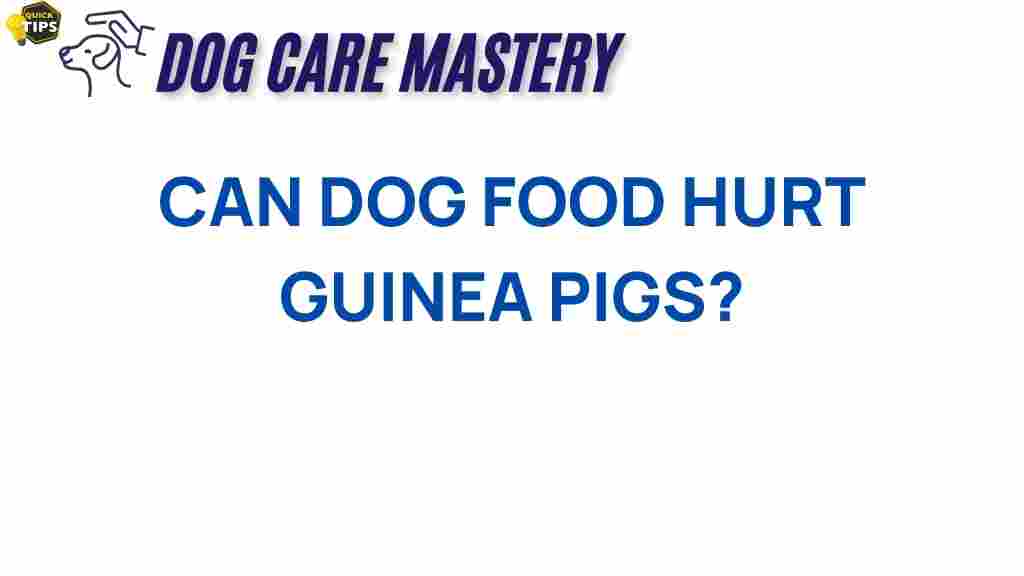Can Dog Food Harm Your Guinea Pig? Understanding the Risks for Guinea Pigs
When it comes to the health and well-being of our beloved pets, it’s essential to be informed about their dietary needs. Many pet owners wonder if it’s safe to feed their guinea pigs dog food, especially when other pets share the same household. In this article, we’ll uncover the surprising truth about whether dog food can harm your guinea pig and what you should know to keep your furry friend healthy.
Understanding the Dietary Needs of Guinea Pigs
Guinea pigs are herbivores, which means their diet should primarily consist of plant-based foods. To meet their nutritional needs, guinea pigs require:
- Fresh hay (timothy hay is ideal)
- Fresh vegetables (like bell peppers, kale, and carrots)
- Commercial guinea pig pellets fortified with vitamin C
- Fresh water at all times
It’s crucial to avoid feeding guinea pigs foods that are high in fat, protein, or sugar, as these can lead to serious health issues. But what about dog food? Let’s delve deeper into why it might not be suitable for your guinea pig.
Why Dog Food is Not Suitable for Guinea Pigs
Dog food is formulated specifically for dogs, taking into account their unique nutritional requirements. Here are several reasons why dog food can be harmful to guinea pigs:
- High Protein Levels: Dog food tends to have a much higher protein content than what guinea pigs need. Excessive protein can lead to kidney problems and other health issues.
- Fat Content: Many dog foods contain fats that are not suitable for guinea pigs. A high-fat diet can result in obesity and other metabolic disorders.
- Lack of Vitamin C: Guinea pigs cannot produce their vitamin C, which is essential for their health. Dog food lacks this crucial nutrient, which can lead to scurvy if relied upon as a food source.
- Artificial Ingredients: Many commercial dog foods contain fillers, preservatives, and artificial flavors that can be harmful to guinea pigs.
The Risks of Feeding Dog Food to Your Guinea Pig
Feeding dog food to your guinea pig can lead to several health problems, including:
- Digestive Issues: Guinea pigs have a sensitive digestive system that is not designed to process animal protein or high-fat foods.
- Obesity: The high-calorie content of dog food can lead to weight gain and obesity in guinea pigs.
- Dental Problems: A diet lacking in fibrous foods like hay can cause dental issues due to insufficient wear on their teeth.
- Vitamin Deficiency: Relying on dog food can result in deficiencies in essential nutrients, leading to serious health conditions.
What to Do If Your Guinea Pig Accidentally Eats Dog Food
If your guinea pig has consumed dog food, don’t panic. Here’s a step-by-step guide on what to do:
- Assess the Situation: Determine how much dog food your guinea pig has eaten. A small amount may not cause immediate harm, but larger quantities can be concerning.
- Monitor Their Behavior: Keep an eye on your guinea pig for any signs of distress, such as lethargy, diarrhea, or changes in appetite.
- Provide Fresh Hay: Ensure that your guinea pig has access to plenty of fresh hay. This will help their digestion and mitigate the effects of the dog food.
- Contact a Veterinarian: If you notice any unusual symptoms or if your guinea pig has ingested a significant amount of dog food, contact your veterinarian for advice.
Common Signs of Health Issues in Guinea Pigs
Being aware of the signs of health issues can help you act quickly should your guinea pig experience any adverse effects from inappropriate food. Look for the following symptoms:
- Changes in appetite or water intake
- Lethargy or unusual behavior
- Diarrhea or unusually firm stools
- Weight loss or gain
- Dental problems, such as difficulty eating or drooling
What Foods Are Safe for Guinea Pigs?
Instead of dog food, focus on providing a balanced diet for your guinea pig. Here are some safe food options:
- Hay: Unlimited access to fresh hay is essential.
- Vegetables: Leafy greens and colorful vegetables, such as romaine lettuce, parsley, and carrots.
- Fruits: Treats like apples or strawberries in moderation.
- Commercial Pellets: Ensure you choose a high-quality guinea pig pellet with no added seeds or nuts.
Tips for Maintaining a Healthy Diet for Your Guinea Pig
To keep your guinea pig healthy, consider the following tips:
- Regularly Change Their Diet: Introduce new vegetables and fruits gradually to prevent digestive issues.
- Consult Your Veterinarian: Regular check-ups can help ensure your guinea pig is in good health and receiving appropriate nutrition.
- Avoid Feeding Them Human Food: Many human foods can be harmful to guinea pigs, including bread, dairy, and processed foods.
- Educate Yourself: Read reputable resources or consult with a veterinarian about the best practices for guinea pig care.
Conclusion: Keeping Your Guinea Pig Safe
In summary, dog food is not suitable for guinea pigs and can pose significant health risks. As a responsible guinea pig owner, it is crucial to provide a diet that meets their specific nutritional needs. Always prioritize fresh hay, vegetables, and high-quality guinea pig pellets. If you ever have concerns about your guinea pig’s diet or health, don’t hesitate to consult with a veterinarian.
To learn more about proper guinea pig care and nutrition, check out this informative guide. Remember, a well-informed pet owner is the best advocate for their pet’s health!
For tips on various pet care topics, feel free to visit this resource for more information.
This article is in the category Safety and created by dogcaremastery Team
